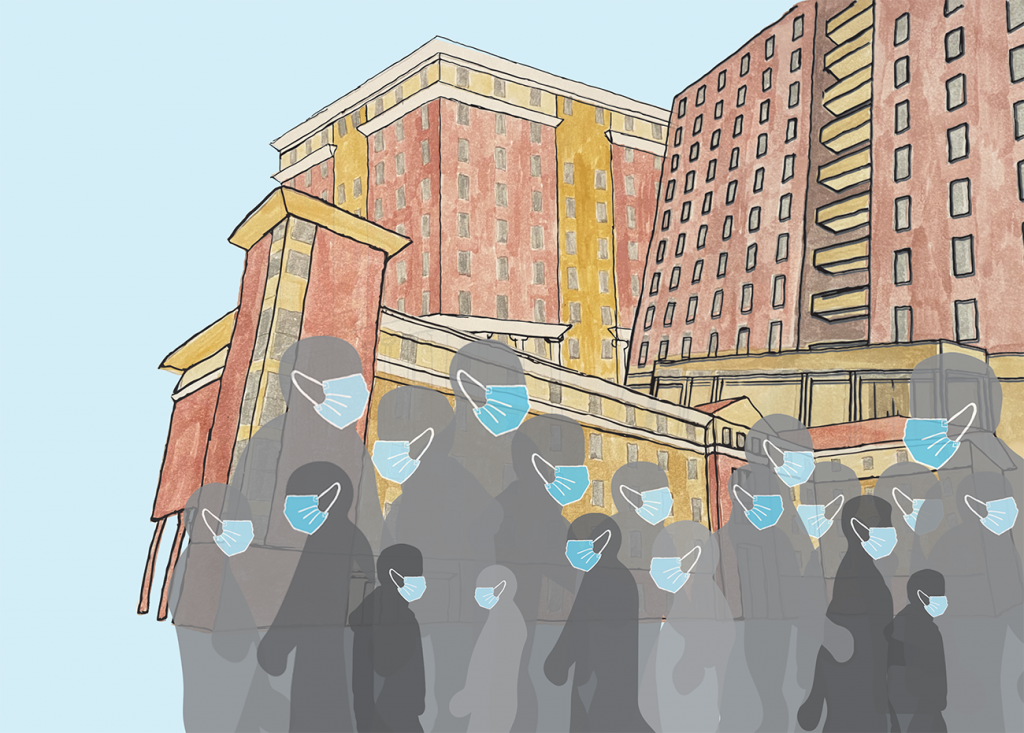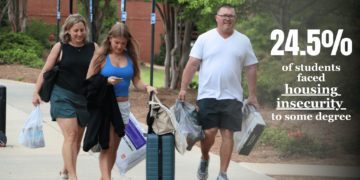
As outbreaks continue to rise in student housing, community assistants are facing a new set of challenges this year. They are responsible for making sure students wear masks and social distance inside dorms, but many say their environments are not safe, and they aren’t being equipped with enough information or resources to do their job effectively.
Community assistants (CAs) often feel the brunt of every issue that impacts students on campus. Whether it’s someone struggling with their homework, racially charged protests on campus or a global pandemic, these student workers are often on the front-lines of keeping students safe and helping them cope, even when putting themselves at risk.
“This is not a new thing,” one CA said. “Two years ago, when the protests were coming to campus, and there were threats made against certain students and organizations, there was a lot more work put on housing. We had to do extra rounds; there was more security. It was the same kind of situation. You think, ‘Yes, this is bad, and we’re being asked to put ourselves at risk a little bit, but we still get to live here.’”
When their virtual training started this fall, CAs had questions about how student housing planned to handle the COVID-19 pandemic that many felt the department never answered.
“50% of our problems come from lack of transparency from leadership and the other 50% comes from the fact that there are a lot of unknowns or answers of ‘I don’t know’ when you ask leadership questions, even though we were told to come back to campus during a global pandemic,” CA Mister Clemmones wrote on Facebook. “I hope I don’t get fired from this, but it’s the truth, we are scared and it needed to be said.”
Multiple CAs said they felt left in the dark about student housing policies regarding the pandemic, many of which the department has not specified, or are continuously evolving based on new guidance from health officials.
“The most difficult thing is that we haven’t been told what to do,” one CA said. “We get a lot of questions from the resident’s like, ‘what’s going to happen’ and, ‘do we have to go back home’ and we don’t really have anything to say to them.”
The CAs quoted in this story were offered anonymity because student housing has strict rules against student workers speaking to the media.
In an email obtained by The Daily Mississippian, Nequel Burlwell, assistant director of student housing for residential learning, urged CAs not to tell students in their building when other residents test positive for COVID-19 because it is a violation of HIPAA and FERPA to share students’ medical information. The email also said CAs could be held liable with job action if they share it.
“We do not want to scare already nervous students, and that includes each of you. We have plans in place to handle these situations as they arise, and you will get the appropriate information at the appropriate time,” Burlwell wrote in the email, adding that the university is doing everything it can to keep students safe.
One CA said they did not feel they could do their job effectively without telling residents when someone in the building tests positive for COVID-19, adding that if they don’t give specifics about who the person is, they believe it would not be a violation of HIPAA or FERPA.
“We should be able to say that we have this number of cases in the building because they have a right to know that their environment is being compromised,” the CA said.
Initially, students were not allowed to quarantine in their rooms. As quarantine bed space became more limited, more outbreaks arose on campus and the Mississippi State Department of Health issued new guidance on quarantining students, the university began allowing them to quarantine in their dorm rooms.
A spokesperson for MSDH said they changed their guidance to be more consistent with CDC guidelines and because it is more efficient and realistic when schools allow students to quarantine in their dorm rooms, though they did not specify the CDC guidelines to which they were referring.
The university’s COVID-19 dashboard now shows 16 outbreaks in student housing. Multiple dorm buildings across campus have more than one entire floor in quarantine, including CAs. With the quarantined CAs unable to work , others are having to work much longer hours.
Director of Student Housing John Yaun said that the university is trying to ensure that CAs do not work more than the 20 hours they are paid for each week.
“Through my conversations with (Associate Director for Residential Learning Jeannie Hopper), she is working to make sure that they’re able to stay within those hours per week because we don’t want to overwork them,” Yaun said. “They’re students, and we have professional staff that also can chip in to really help in certain areas as of right now.”
Some CAs have expressed the desire for hazard pay because they believe they are being asked to work in unsafe conditions. A CA told The Daily Mississippian that there were dead cockroaches scattered throughout the hallways, and many hand sanitizer stations were unfilled when they moved into their dorm in August. Another said they held their breath while doing rounds on a floor where they knew some students tested positive for COVID-19.
“Knowing what we know and still coming back and still taking the job, I think, not just us, but our maintenance staff, our (janitorial) staff and anybody who works closely with a lot of students should be getting hazard pay,” one CA said. “They did tell us we were getting a $1 raise, but it only applies to overtime (front desk) hours, and international students don’t qualify because they can’t work overtime hours.”
According to Yaun, student housing has implemented a number of safety protocols to keep CAs safe this fall.
“We have kits available with hand sanitizer and gloves that we provide, and we try to ask students to distance, even between each other when they’re walking rounds in the building,” Yaun said. “We also have plexiglass set up at each front desk, so there’s that barrier between them as well.”
Yaun also said that CAs do not have to perform rounds on floors with quarantined students, and the university plans to monitor those floors using security cameras.
A CA in a building with multiple floors quarantined said that quarantined students can leave their rooms to go to the bathroom or go outside for fresh air.
“We can’t really enforce that, though. They could just go somewhere, and we wouldn’t know,” they said.
While the university provides some safety equipment such as masks, gloves and hand sanitizer, CAs said that some supplies can run low quickly. One said that their building’s front desk runs out of masks almost daily because they hand them out to students who walk into the building or come out of the elevator without one.
Getting freshman students to comply with COVID-19 safety protocols, especially wearing masks, has proven to be a challenge for CAs.
“It’s hard because I don’t like to yell at my residents, but I started yelling at them,” one CA said. “You have to kind of say it in a stern voice, or they’re not going to care.”
Many CAs resigned this summer and into the fall, and some buildings still have unstaffed positions. Yaun said that he is confident in student housing’s ability to fill all of its CA positions, but the department would look to recruit more staff if deemed necessary.
Paul Gebeline, a former CA from Stockard Hall, resigned this summer as COVID-19 cases in Mississippi continued to rise. Gebeline said his primary concern was that he would be exposed to the virus by sharing a communal bathroom with roughly 50 people.
“I don’t want to blame student housing entirely, because I feel like they got the short end of the stick,” Gebeline said. “Ole Miss leadership told them, ‘(Students) are coming back, and you have to figure out how to not let it spread,’ but there’s only so much you can do.”
Laura Stephens, a former CA from Martin Hall, also resigned this summer because she was afraid that she would have nowhere to go if student housing closed again.
“I just really could not risk not having a job in the middle of the year, and then not having a place to live,” Stephens said. “Because I don’t live with my parents, my place to live is kind of limited, and I also didn’t want to risk getting sick.”
Stephens said resigning was a very difficult decision for her, but in the end, the risk out-weighed the benefit.
“I cried about it a lot when I was making the decision because I definitely loved being a CA, and I loved being there for those girls,” Stephens said. “It just ended up making way more sense, financially, for me to not come back.”
In March, when the university transitioned to online learning, student housing continued to pay CAs throughout the semester even though they were not working in residence halls. However, some CAs are worried that the university will stop paying them if dorm buildings close this fall, and have cited a clause in the community assistant employment agreement that says the contract can be amended without the CA re-signing it.
Some CAs also said the university has given them conflicting messages regarding whether payment will continue if student housing closes some time this semester.
“They’ve said that if the school closes, and we’re sent home, that CAs will continue to be paid, but then they’ve also said ‘we’ll try to keep you on the payroll as long as possible,’ and it’s like, well, which is it?” one CA said.
When asked by The Daily Mississippian, Yaun did not want to answer if the department will continue to pay CAs in the event of a student housing shutdown.
“I don’t want to speculate forward on about if we close the halls,” Yaun said. “I think what we’re doing is we’ve got a number of really good protocols and parameters in place, and I think that we’ll continue to monitor those and be mindful of those, and just really take this one day at a time.”
Though many CAs have resigned, some of them believe that the ones still working are at least partially dependent on their job with the university because they rely on their housing scholarship to help pay for tuition costs and living expenses.
“CAs are dropping fast because it’s not fair, but it is what it is, and I still need the scholarship money to help me out,” one CA said. “Some people need this job, and they enjoy this job, but in the circumstances we’re being given, it’s very difficult to feel like we’re being heard or cared about.”


























